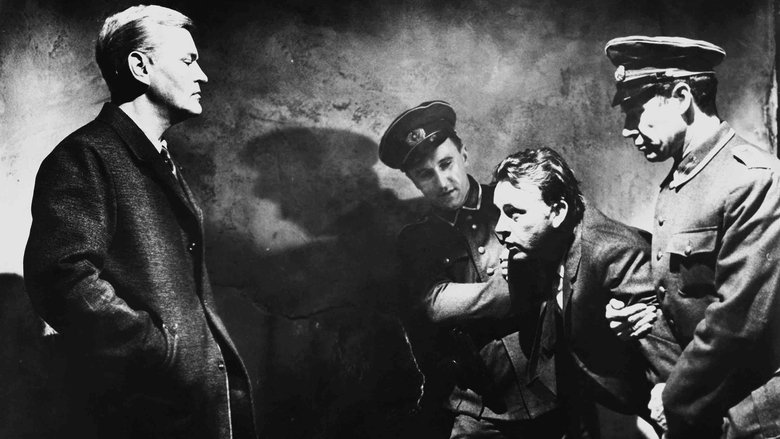← Back to Reviews

in

The Spy Who Came in From the Cold, 1965
During the Cold War, Alec Leamas (Richard Burton) is pulled into an elaborate and dangerous plot. Feigning a dismissal from his post and slide into bitter alcoholism, Leamas navigates himself into a position whereby he is recruited by agents in East Berlin. Leamas must convince a savvy agent (Oskar Werner) that he's legit, but the longer the deception goes on, the more Leamas begins to question his role in the whole pursuit. His ambiguous feelings are only further complicated by his relationship with a Communist librarian (Claire Bloom) that he seduces as part of his plan.
I thought I knew what I was getting into with this film. After all, it's adapted from a novel by John le Carre. I would imagine most people have seen either the miniseries or the film adaptation of Tinker, Tailor, Soldier, Spy (I have seen and enjoyed both). In fact, the character of George Smiley even makes a few appearances.
But while the first half of the film is exactly what I expected (low-key conversations, plotting, crosses, double-crosses, etc), around halfway through the film the story takes an interesting turn. While Leamas starts out just playing a jaded and bitter employee, as the plan progresses some of his cynicism stops being a ruse.
A large part of this shift comes from the conversations he has with Nan, the librarian. While Leamas is incredibly dismissive of her beliefs, she is genuine in her desire to help build a better world. There is an undeniable element of decency to her, a decency that contrasts with the character of the men fighting on Leamas' side. But the other aspect is Leamas slowly realizing just what is at stake. One man is killed so that another man might be free. One man is thrown under the bus so that another might be redeemed. There's something mechanical and borderline useless about it.
In fact, maybe the most interesting thing about the film is the way that it portrays both interesting and engaging spy-craft, and then turns around and de-glamorizes it all. There's a quote from the last act that begs to be highlighted:
It's this second half of the film that really elevates it to something special. The ending in particular is something I found very powerful.

The Spy Who Came in From the Cold, 1965
During the Cold War, Alec Leamas (Richard Burton) is pulled into an elaborate and dangerous plot. Feigning a dismissal from his post and slide into bitter alcoholism, Leamas navigates himself into a position whereby he is recruited by agents in East Berlin. Leamas must convince a savvy agent (Oskar Werner) that he's legit, but the longer the deception goes on, the more Leamas begins to question his role in the whole pursuit. His ambiguous feelings are only further complicated by his relationship with a Communist librarian (Claire Bloom) that he seduces as part of his plan.
I thought I knew what I was getting into with this film. After all, it's adapted from a novel by John le Carre. I would imagine most people have seen either the miniseries or the film adaptation of Tinker, Tailor, Soldier, Spy (I have seen and enjoyed both). In fact, the character of George Smiley even makes a few appearances.
But while the first half of the film is exactly what I expected (low-key conversations, plotting, crosses, double-crosses, etc), around halfway through the film the story takes an interesting turn. While Leamas starts out just playing a jaded and bitter employee, as the plan progresses some of his cynicism stops being a ruse.
A large part of this shift comes from the conversations he has with Nan, the librarian. While Leamas is incredibly dismissive of her beliefs, she is genuine in her desire to help build a better world. There is an undeniable element of decency to her, a decency that contrasts with the character of the men fighting on Leamas' side. But the other aspect is Leamas slowly realizing just what is at stake. One man is killed so that another man might be free. One man is thrown under the bus so that another might be redeemed. There's something mechanical and borderline useless about it.
In fact, maybe the most interesting thing about the film is the way that it portrays both interesting and engaging spy-craft, and then turns around and de-glamorizes it all. There's a quote from the last act that begs to be highlighted:
What the hell do you think spies are? Moral philosophers measuring everything they do against the word of God or Karl Marx? They're not! They're just a bunch of seedy, squalid bastards like me: little men, drunkards, queers, henpecked husbands, civil servants playing cowboys and Indians to brighten their rotten little lives. Do you think they sit like monks in a cell, balancing right against wrong? Yesterday I would have killed [redacted] because I thought him evil and an enemy. But not today. Today he is evil and my friend. London needs him. They need him so that the great, moronic masses you admire so much can sleep soundly in their flea-bitten beds again. They need him for the safety of ordinary, crummy people like you and me...
